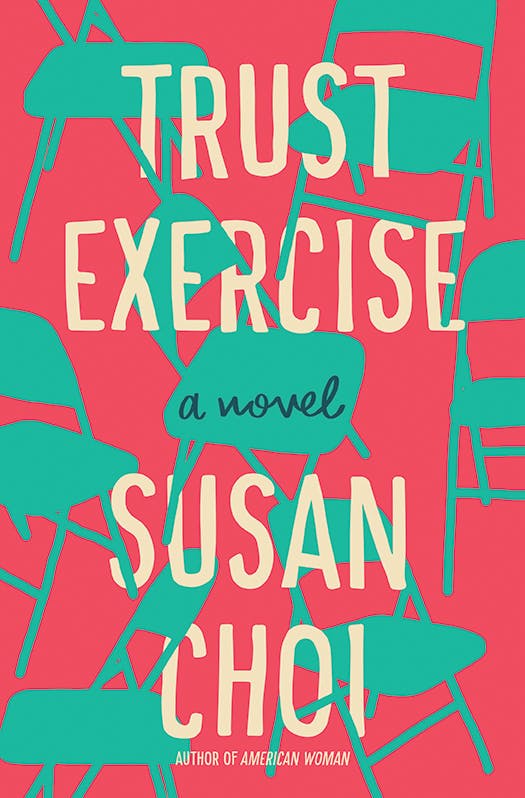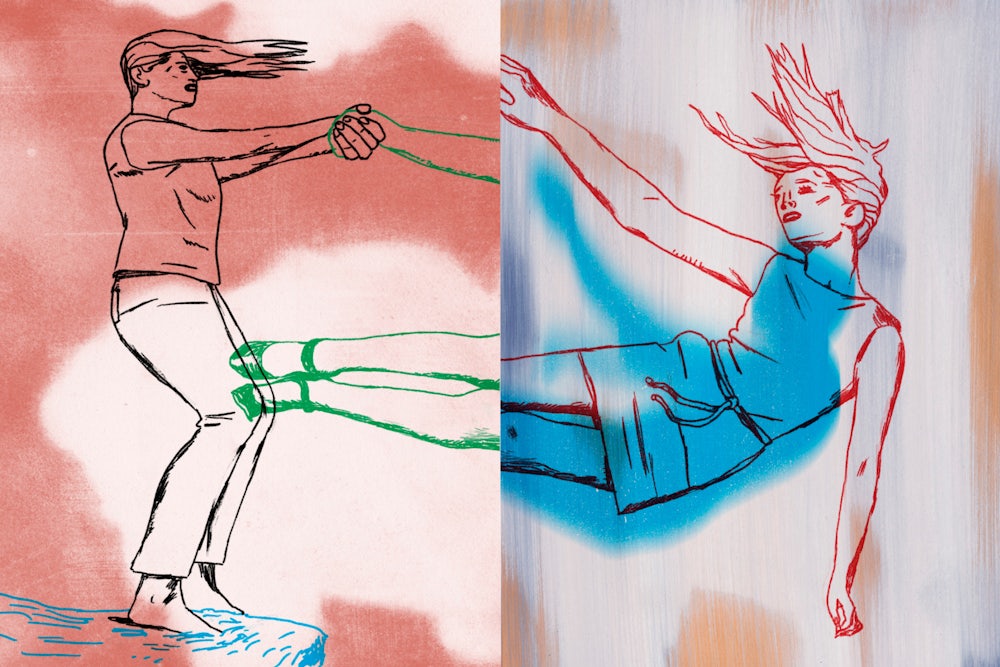Half-child and half-adult, adolescents are not very interesting. Adolescence is a temporary madness, common as a cold and usually about as profound. Maybe that’s one reason it interests artists: Teens are mostly a blank and to have once been a teen is universal for adults. “Young people like you experience pain more intensely than those of us just a little bit older,” explains one of the adults in Susan Choi’s novel Trust Exercise. “I speak of emotional pain. Your pain is greater, in duration and strength. It is harder to bear. This is not a metaphor.” When a novelist tells you something is not a metaphor, do you believe her?

Trust Exercise begins at a high school known for its performing arts curriculum, in a “vast southern city” that the author never names for no discernible reason (Choi was raised in Houston, and attended a drama program in high school, for what that’s worth). It’s the 1980s. We meet several students in thrall to a charismatic teacher, Mr. Kingsley, a ponderous creature of the theater—he prefers “theatre”—who lives bravely out of the closet. A romance between two of the students, Sarah and David, is the prism through which we see the academic year: touchy-feely classes in which Kingsley subjects his pupils to what feels like psychological torture; auditions for and the mounting of the big show (Guys and Dolls); the triumphant cast party; and a visit from some British thespians—high schoolers, as well as their teacher and his former student, now the head actor.
The arrival of these glamorous foreigners changes things. “Perhaps it was all a mirage they induced with their accents, poor imitations of which became a widespread affliction of the sophomore class. The impression of power they gave seemed not wrought but inevitable.” That power, real or not, throws the rest of the school into something approaching chaos. There’s high drama, of a sort; I thought of the turbulent Canadian teen soap Degrassi. A crescendo comes midway through the book, and readers turn to the latter half with the expectation of denouement. But there they will by stymied—or frustrated, or fascinated, or irritated. The author has other plans.
As a title, Trust Exercise is a feint, seeming to refer to Mr. Kingsley’s vaguely nefarious classroom sessions, until we realize that it describes the novel itself. If to read a book is to fall backward, here Choi decides not to catch you. Every novel since Tristram Shandy has been a trust exercise, a bargain between reader and writer, and violating that deal has proved irresistible to many writers. Susan Choi has long attempted to subvert the territory of a story, giving us the private account of historic event, the fresh perspective on the tale we think we know, the stubborn subjectivity of truth. These were thematic preoccupations. Trust Exercise sees the author rethink form and shape. This is a novel, broken apart. It’s a strategy for reminding the reader that stories are always more complex, more contested, than they seem.
In her previous and significant body of work, Susan Choi showed herself a master of the old-fashioned tricks of the old-fashioned novelist. She understands character, and dialogue, and scene. Both historical fictions, her first two novels looked critically at events that shaped the world we live in now. In 1998, three years after completing her MFA at Cornell, she published The Foreign Student, a dual narrative set at midcentury that bounces between the American South and the Korean Peninsula. Chuck is the foreigner of the title, a refugee fleeing the civil war at home, treated less as a fish out of water in the genteel college town where he lands than an actual alien. Katherine is a local girl haunted by sexual abuse at the hands of a vaunted professor. Their collision is what is of interest; their romance almost an afterthought.
In 2003’s American Woman, Choi again turned to history, dramatizing the 1974 kidnapping of Patty Hearst, though changing names and particulars. Her protagonist isn’t the heiress on the run but Jenny, a Japanese-American radical who is sort of a friend and sort of a co-conspirator. She has a real-life analogue, a woman named Wendy Yoshimura, who was Hearst’s roommate in San Francisco when the police finally caught up with her. A cocktail of money and madness, the Hearst saga is a quintessentially American story, but in Choi’s telling, the American woman is the one history has forgotten, or never really noticed. Jenny is neither hero nor antihero. Maybe she’s just a real person, who happens to be a person of color.
In 2008, Choi published A Person of Interest, which reaches back only as far as the waning days of the Clinton administration. Nevertheless interested in events of historic significance, it conjures a Unabomber-like vigilante, and the title refers to the man the FBI believes will lead them to him—a professor of mathematics who is, we are told with no specifics, Asian. This character seems to have been inspired by Wen Ho Lee, the nuclear scientist arrested as a spy in 1999, and later cleared of all charges with an apology. What made him a suspect? An FBI agent in Choi’s novel believes that “certain persons, of certain racial and cultural backgrounds, are immune to the polygraph test.” For these people, he explains, “it produces false negatives, always. It can never detect deception.”
The racism that greets Chuck in The Foreign Student and the strange invisibility of Jenny in American Woman could be thought to reflect a different, earlier America. A Person of Interest shows us that this past is not nearly as distant as we pretend. These three books are too complex to be reduced to a single interest, but you can’t talk about Choi’s project without talking about race. Though the novels narrow to take in one particular life, they feel epic, because, of course, every life has its own sweep. The novelist’s attention is what makes a character into more than just a person—a way to explore race and class and identity. It’s up to the author. We talk about Patty Hearst, but do we talk about Wendy Yoshimura?
If subjectivity is one of Choi’s preoccupations, of course sex is rich territory: It’s one story always with two (or more!) distinct perspectives. The central sexual relationship in the first section of Trust Exercise is between Sarah and David, and they command most of the narrative’s attention, though we are given glimpses of other students as well. I was primed for a #MeToo story of power and abuse, because of the implication that Kingsley has an inappropriate relationship with one of his students. That’s a red herring somewhere near the end of the first act.
A simple chapter break prepares the reader for a disruption. I assumed we were going to read about these teens as adults, and revisit the events that had just transpired. So we do—but only after being told that the section we’ve just finished reading was a lie. More to the point, it was a novel, albeit one drawn from life; its author was Sarah, all grown up. She’s changed names and some details, and most damningly, in the eyes of her classmate Karen, she’s overlooked the real story: the story of Karen. In a strange blend of first and third person, Karen struts onto the stage to tell us that Sarah has wronged her, revising her out of their young lives. Karen barely appears in Sarah’s novel; if there are hidden clues in that text, undermining its authority, I did not find them. This is basically the first time we meet her, aged 30, full of very specific complaints. We learn that her story is quite dark. There has been bitter rejection, an unplanned pregnancy, a child placed for adoption.
In its shape, Trust Exercise reminded me of two recent novels that have been much celebrated for, among other things, their formal audacity: Lisa Halliday’s Asymmetry, from 2018, and Garth Greenwell’s What Belongs to You, from 2016. These three books are all told in three sections. In Asymmetry, the first two sections are entirely different but share a language of metaphor and reference; the short final section is like the punch line to a joke. In Greenwell’s book, the sections function almost as enclosed stories, linked by character and voice (the author even published an earlier version of one as a self-contained novella). In each, the discrete parts turn out to have less to do with one another than readers might expect. They’re not chapters in, but facets of, a story. The reader must take all three and make what she will of the whole.
Trust Exercise is a more deliberate violation of the reader’s faith. Choi gives us one story, then another contradictory one. In the book’s first act, Choi renders the teen drama well—she’s a great writer—but it still feels somehow lacking, vague and hard to care about, like an amateur production of a great play. I don’t know if there’s any deeper takeaway than that teens are solipsists with big feelings—a contrast with Choi’s previous books, which so deftly illuminate the story that you might have overlooked. In the second act, having deployed its narrative switch, Trust Exercise seems not to know what to do. Karen’s tale is affecting, sure, but we have no emotional investment in this character when she takes control of the book. Choi’s saying something about reliability and narrative, but she overlooks the fact that the novel as a form doesn’t work if you don’t feel something for the people inside of it.
There’s a third act, which feels like a coda, and it rather dutifully asks more questions than it answers. It’s Rashomon High School, where we learn there are many sides to every story. The trouble is that these competing versions of reality reveal little that’s new. Trust Exercise is Susan Choi’s fifth novel in two decades, and some fatigue with business as usual is probably to be expected. But I hope this new book doesn’t mark a repudiation of the traditional form in which she has worked until now. I do not mind a book that toys with its reader, but I wish Susan Choi had trusted herself more.
